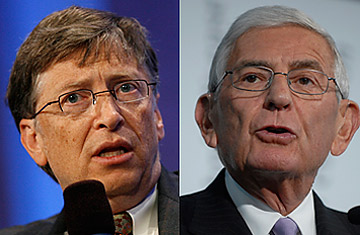
Bill Gates (left) and Eli Broad
In choosing the next president, American voters have their fair share of crises to consider, be it the economy, healthcare, or national security. But will education be on many voters' minds on Nov. 4? Increasingly, the answer appears to be no.
The latest evidence is the decision by two of the country's largest philanthropies to stop funding Ed in '08, a nonpartisan campaign created to make improving education a top priority in the 2008 presidential race. When Ed in '08 launched 16 months ago, the Bill and Melinda Gates Foundation and the Los Angeles-based Eli and Edythe Broad Foundation promised $60 million to finance the single-issue project. Now, however, $24 million into the campaign, both organizations have decided to pull the plug.
Chris Williams, a program officer at the Gates Foundation, says that's because Ed in '08 "has been able to get the job done on less." One measure of the campaign's success: having had either John McCain or Barack Obama sign on to all three of Ed in '08's main policy pushes. But you'd be hard-pressed to find any election followers who can list what those three policies are — alternative pay for teachers, high standards, and extended learning time — and the candidates remain vague on what they will do about them.
Williams says the project has achieved its stated goals on a much slimmer budget and still has sufficient funds to sustain the campaign through March 2009, its original end date. Of the initial $60 million pledge, he adds, "That was always an 'up to' aspirational goal." The Broad Foundation did not return calls for comment.
Others, however, see the decision as one of surrender to the realities of this particular election. Over the past two decades, nearly every presidential candidate at one time or another has claimed the title "education president." This time around, though, the issue has been consistently overshadowed, especially amid the financial crisis that has erupted in recent weeks. "If Bill Gates is throwing in the towel, there's no hope for the rest of us to get education on the agenda," says Arnold Fege, advocacy director for the Washington-based nonprofit Public Education Network.
News of the decision to stop funding Ed in '08 comes four days after the leaders of the campaign, along with New York City schools chancellor Joel Klein and the Rev. Al Sharpton, sent a letter to vice-presidential debate moderator Gwen Ifill urging her to ask more questions about education. The Sept. 29 letter noted that in this election cycle, just 20 of the 653 questions asked at 30 presidential debates have dealt with education — about 3%. "In the last Democratic debate in Cleveland, for instance, Senators Obama and Clinton spent more than 15 minutes discussing health care, [while] no education questions were asked," the authors said. "If the presidential debates were a barometer, there would be little indication of any problem in America's schools."
Problems, of course, abound. The same letter noted that on recent international exams, American 15-year-olds rank 21st out of 30 in science and 25th on math. Only 57% of black and 60% of Hispanic students in the U.S. graduate high school. And these figures represent only the tip of the iceberg for how many public schools are falling behind.
Even after receiving this impassioned plea, Ifill did not ask any direct questions about schools during Thursday's vice-presidential debate. However, when she asked about budget priorities, Joe Biden vowed the Democratic ticket would not scale back its $18 billion education-spending plan, despite the $700 billion federal economic bailout Congress was working feverishly to pass. "We won't slow up on education because that's the engine that's going to give us the economic growth and competitiveness we need," Biden said. Sarah Palin, for her part, called for state standards to be raised as well as funding. The Republican vice-presidential nominee also decried the lack of attention education has received, adding, "It's near and dear to my heart."
That may be true, but she and the others fighting for votes on Nov. 4 are hardly putting education front and center in this election. Among those lamenting this season's priorities is Intel chairman Craig Barrett, who this fall is heading up Achieve, a corporate-driven education initiative that is separate from Ed in '08. Barrett says no one is talking about how we've set such low expectations for our students, who are falling behind other nations'. Instead, he says, "The national debate is on did Sarah Palin shoot a moose or a caribou? Let's get over it."
